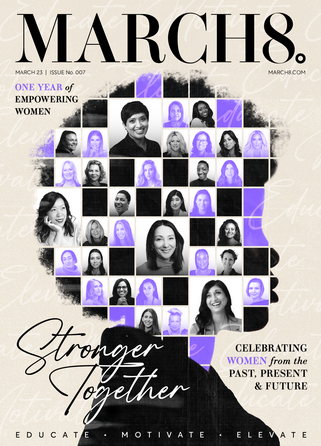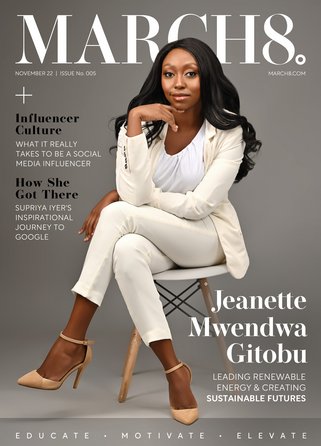Becoming a leader with New Relic’s Riya Shanmugam

Riya Shanmugam grew up in a conservative town in southern India and attended college near her home. Upon graduation from the Amrita School of Engineering with a Bachelor of Science in Information Technology at the age of 21, she moved to the United States to work as an engineer at AMD while pursuing her MBA. Throughout her career, she has held numerous senior technical and advisory positions at prominent companies such as IBM, Google Cloud, and Adobe. In 2021, she joined New Relic as the head of the company's global channel strategy.
We sat down with Riya to hear more about her groundbreaking career, and to discover how she’s making a positive impact on the world around her.
Hi Riya, tell us how moving from India to the US helped your career.
Growing up in India, you pretty much have three options for what your parents will deem a successful career: engineer, doctor, or attorney. My father realised I was good at maths and inspired me to take the engineering path. But I soon realised that I wanted to move to the US to study for my MBA. I’m a social being, and as much as I love the technical side, I couldn’t spend the rest of my life sitting in a cubicle, writing code. The only challenge was that my parents wouldn’t support me emigrating until I was married. So, I married by 21, and without any big commitments, I moved to Austin, US, where my husband lived, as it seemed like the right time to take the jump before we started a family.
Once I arrived here, I got my MBA because I knew that as much as I was interested in the technical side of things, I wanted to enter the business world too. I had two start-ups that fizzled, but from which I learned a lot, and then joined IBM where I discovered that I prefer being an ‘intrepreneur’ rather than an entrepreneur.
How have you developed your leadership skills over time?
While I was working for free at my first job at a startup after my MBA in the US, my boss, the CEO, shared with me guidance and lessons about running a company, which ended up being priceless. It really gave me a taste for leadership, which was eventually what led me to join the programme at IBM where I was able to hone my leadership skills before taking them into the workforce.
But my first lessons in leadership came from my mum. She wasn’t a career woman, but I come from a big family, and she ran a lot of businesses within the family. She showed me that it’s always best to lead with empathy and love – two things that are foundational to any relationship. It’s become my real superpower – being real and leading with empathy. As a leader my goal is to recognise that everyone is a human first, and teammates, customers and partners second – so I’m always looking for ways to help solve their problems and make their lives better.
What challenges have you faced throughout your career?
Women of colour in tech face a huge number of hurdles. I can’t even remember the first time I experienced gender or racial bias in the workplace, because it’s been prevalent throughout my entire career. For example, when I started out, I was selling legacy technology mainframes. But this was so difficult because none of the people I was trying to sell to could relate to an ethnically diverse woman in sales selling mainframe computers.
That inherent bias was difficult to overcome when I was younger and trying to prove myself. When I was in my 20s, I would take particular pains to appear older or more serious, wearing pantsuits or glasses – even though I didn’t need them. Even now, I don’t see many female millennial executives of colour. And I still find that when I’m attending work events, some just assume that I am my male co-workers’ executive assistant until I speak.
As women, particularly in male-dominated fields, I feel like it’s our duty to lift other women up. Nonetheless, I’ve also had support from a lot of male mentors who have helped me believe in myself and my abilities. This was another drive that has helped me become a strong leader and professional in my field. I respected them, and their skills and opinions, so I would push myself to succeed to not let them down.
What has been the secret to your success?
I’ve always battled with my imposter syndrome internally, but oddly enough it has ended up being one of the keys to my success. It really hit me when I was working at Google. On any given day I would be in a meeting with someone who invented part of Gmail. Or on an elevator with one of the fathers of the Internet, Vint Cerf. I also spent time with fashion icon Anna Wintour, Sadhguru from Isha Foundation, and many more unreal experiences with visionaries of the world from many fields. It was just like, ‘how the hell did I get here?’. But this humility helped push me to become a better version of myself. I learned to grow and evolve and realise that it doesn’t matter – I am good at my job, I have a lot to contribute and I’m a great leader.
What advice would you give to other girls considering moving countries to progress their careers?
1. Don’t hide who you are. When I moved to the US, I had a really strong Indian accent. I’d gone to excellent schools, so my English was great, but I became insecure about speaking because people would find it difficult to understand me. I was very fortunate to have a boss early on who would consistently ask me to vocalise my opinion and helped break me out of the shell that had begun to grow since I moved.
2. Seek out mentors. I can’t stress enough how much mine have helped me throughout my career. Some have been more active, people I’ve known who have taken the time to teach and guide me. But others are people I’ve never even met, people I admire – and wish I knew personally – but I’ve learned a lot by observing them from a distance.
3. Don’t let anybody tell you you can’t do it. Focus on your immediate goals and forget about what’s happening in five or ten years. Just think about what you want to achieve next in your personal or professional life and go for that. One of the most useful tools for this is having confidence in your abilities. I stopped wearing the pantsuits and glasses I didn’t need when I realised it was enough that I knew my stuff. It sounds a bit cliché, and it’s also easier said than done, but having conviction in yourself has helped me come out the other end stronger.
Featured Articles
B Corporation certification has long been hailed as the gold standard of sustainability – we explore why
How does a retail investor replicate, as closely as possible, a venture capital investment strategy? Paula Tavangar of SwissBorg Ventures explores
Michelle Li shares how parents can ensure their children are taking the right steps to a more sustainable future



